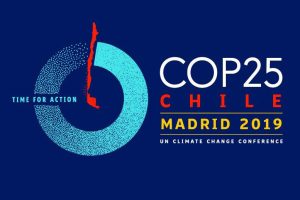A high-level event during the 2019 UN Climate Change Conference addressed what it means to realize a circular economy in various sectors, and highlighted key solutions to reach net zero emissions across all sectors by 2050. The dialogue was organized by ICLEI – Local Governments for Sustainability, the Sustainable Development Solutions Network (SDSN) and the World Business Council for Sustainable Development (WBCSD).The Low-Emissions Solutions Conference (LESC) Dinner Dialogue took place on 9 December 2019, on the sidelines of the 25th meeting of the Conference of the Parties to the UNFCCC (COP 25) in Madrid, Spain.
Sachs warned against the “big lie” that net-zero emissions commitments hurt the economy.
In opening remarks, ICLEI President Ashok Sridharan highlighted the ICLEI Green Circular Cities Coalition. SDSN Director Jeffrey Sachs underscored the need to pressure governments to commit to net-zero emissions by 2050, and warned against the “big lie” that such commitments are detrimental to the economy. In a keynote address, Peter Bakker, WBCSD President and CEO, said policymakers must: put a price on carbon; better manage climate risks; and end fossil fuel subsidies.
In a dialogue session on a systems approach to mitigating emissions, a number of participants urged the decarbonization of production and the electrification of consumption. They also suggested considering the behavioral changes required for transitioning towards a circular economy. Speakers also highlighted: the role of the financial sector in mobilizing the capital to achieve net zero emissions; the Global Environment Facility (GEF) Global Platform on Sustainable Cities, under which businesses and local authorities are working together despite political constraints; that lengthy climate negotiations have the “advantage” of creating frustration in the private sector, which drives change in business models to address climate change; that the Paris Agreement on climate change was a first step towards a massive societal transformation and a new political environment; and that Brazil’s private sector is taking the lead in lobbying for better government regulation that would embrace carbon pricing.
A second dialogue session considered what the circular economy means for the energy, buildings, transport, water and industrial sectors. Participants cited the need for cooperation across sectors to develop new solutions, calling for systemic rather than sectoral transformations.
Bill Peduto, Mayor of Pittsburgh, Pennsylvania, US, said his city’s recovery model, which was applied following an economic crash, is in jeopardy due to petrochemical companies seeking to relocate to the region. Minna Arve, Mayor of Turku, Finland, said her city has been able to reduce emissions by 30% from 1990 levels while maintaining economic growth. [IISD RS Coverage of the LESC Dinner Dialogue] [LESC Dinner Dialogue Announcement]
SDGs
Issues
- Follow-Up and Review,
- Energy Efficiency,
- Chemicals & Wastes,
- Climate Change,
- Economics & Investment,
- Energy,
- Governance,
- Other Energy Sources,
- Human Settlements & Population,
- Industrial Development,
- Monitoring & Evaluation,
- Sustainable Consumption & Production,
- Sustainable Development,
- Stakeholder Participation,
- Transport,
- Water & Sanitation

